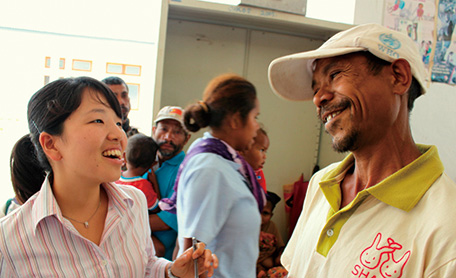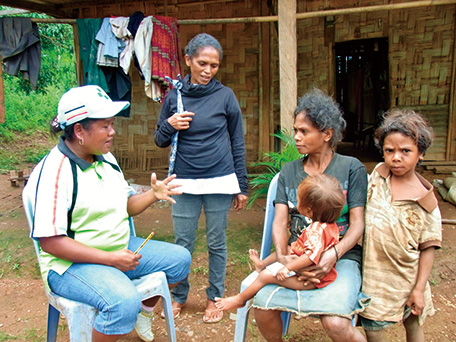Japan's Official Development Assistance White Paper 2012
Stories from the field 4
NGO Promotes Physicals for Mothers and Children in Timor-Leste
– SHARE (NGO) Supports Training of Family Health Promoters –

Ms. Yoshimori listens to FHP describe their activities. (Photo: Yu Yoshimori)
Timor-Leste gained independence from neighboring Indonesia in 2002. However, roads, bridges and other infrastructure were destroyed and health care facilities suffered major damage in the struggle for independence, and many people still do not have access to medical services. The mortality rate for children under five years of age in 2010 was 55 per 1,000 births, and the mortality rate for expectant and nursing mothers in 2008 was as high as 370 per 100,000 births.
There is a devastating lack of health care professionals in Timor-Leste. There were 135 physicians in the country before the 1999 upheaval, however that number fell to as low as 13 as more and more physicians left Timor-Leste because of the conflict. To improve medical services under such extremely restrictive circumstances, the Ministry of Health introduced the Family Health Promoter Program (FHPP) in 2005 so that Family Health Promoter (FHP) could offer education on maternal and child health, which includes information about physical checkups for mothers and children. FHP trained representatives from each community and began to build a system by which the representatives could administer physical checkups to expectant and nursing mothers and children on their own.
SHARE (Services for the Health in Asian and African Regions), a community of citizens for global health cooperation, is a Japanese NGO that has administered medical aid to Timor-Leste since 1999, before the country gained independence. SHARE specializes in health care and has offered aid to improve the health care system in Timor-Leste. It has implemented the Strengthen Health Staff's Support for FHP Activities in Aileu District, a JICA Partnership Program, since 2007.

A health center midwife and an FHP encourage a woman who is four months pregnant to get a checkup on a door-to-door visit. (Photo: Yu Yoshimori)
Registered dietician Yu Yoshimori gained knowledge and experience in improving the diets of mothers and children as she did her work, and she wanted to use that knowledge and experience to administer aid on the ground in foreign countries. As a result of her hard work, she served as an on-site SHARE project manager from November 2009 through January 2012. "District health care professionals trained FHPs, and the training was not going well," Ms. Yoshimori said. "Our assignment was to improve their proficiency so that they could expand their health care services to reach the entire district. Other international NGOs offer services directly to communities, but I thought that SHARE's approach of driving an FHP system set up by Timorese themselves would effectively improve people's health."
The inland district of Aileu is the most mountainous of Timor-Leste's 13 districts, and it would not be possible to expand health care services to reach remote areas in the mountains without the help of people in the communities. Ms. Yoshimori and six other local SHARE staff members diligently reached out to district workers and worked together with them to prepare for FHP training. Ms. Yoshimori focused on encouraging them to look back at what they did while they prepared annual plans and textbooks and helped with volunteer training and other work of the health care professionals. She urged them to verify the results of their work in order to enhance its quality. Once the workers became accustomed to the work and produced results, they started proposing plans on their own. "There is a strong desire in Timorese people to make their country better," Ms. Yoshimori said. "That is why I tried to understand and share in their dreams."
The results had a profound effect on the attitudes of community members. Once they got involved in the program, people who didn't seem to care about anything unrelated to themselves before started having meetings in their communities and talking about what to do for physical checkups. The Ministry of Health even recognized the steady progress and chose health care professionals from Aileu District to give a presentation at a national conference because Aileu had performed the best of all the districts.
The 200 FHPs trained in Aileu District give regular physical checkups, and their rate of coverage has increased dramatically. However, half of children under five years of age are still undernourished and underweight, and more complete health care education and other issues abound. Ms. Yoshimori believes that the key to improving conditions is cooperation between professionals and community members: "Health care professionals are quite elitist; they believe that teaching is useless because community members will never understand. But that is not the case. Community members have wisdom and the ability to take action. If professionals turn their attention to community members and learn about life in remote areas, they can work together with community members and reduce the number of people who die from preventable diseases."
